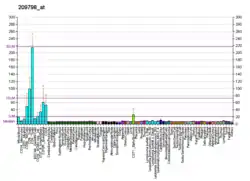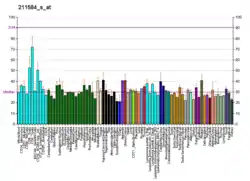NPAT (gene)
Protein NPAT also known as nuclear protein of the ATM locus is a protein that in humans is encoded by the NPAT gene.[5][6]
Interactions
NPAT (gene) has been shown to interact with Glyceraldehyde 3-phosphate dehydrogenase[7] and POU2F1.[7]
References
- GRCh38: Ensembl release 89: ENSG00000149308 - Ensembl, May 2017
- GRCm38: Ensembl release 89: ENSMUSG00000033054 - Ensembl, May 2017
- "Human PubMed Reference:". National Center for Biotechnology Information, U.S. National Library of Medicine.
- "Mouse PubMed Reference:". National Center for Biotechnology Information, U.S. National Library of Medicine.
- Imai T, Sugawara T, Nishiyama A, Shimada R, Ohki R, Seki N, Sagara M, Ito H, Yamauchi M, Hori T (Jun 1997). "The structure and organization of the human NPAT gene". Genomics. 42 (3): 388–92. doi:10.1006/geno.1997.4769. PMID 9205109.
- "Entrez Gene: NPAT nuclear protein, ataxia-telangiectasia locus".
- Zheng L, Roeder RG, Luo Y (Jul 2003). "S phase activation of the histone H2B promoter by OCA-S, a coactivator complex that contains GAPDH as a key component". Cell. 114 (2): 255–66. doi:10.1016/S0092-8674(03)00552-X. PMID 12887926. S2CID 5543647.
Further reading
- Imai T, Yamauchi M, Seki N, Sugawara T, Saito T, Matsuda Y, Ito H, Nagase T, Nomura N, Hori T (May 1996). "Identification and characterization of a new gene physically linked to the ATM gene". Genome Research. 6 (5): 439–47. doi:10.1101/gr.6.5.439. PMID 8743993.
- Byrd PJ, McConville CM, Cooper P, Parkhill J, Stankovic T, McGuire GM, Thick JA, Taylor AM (Jan 1996). "Mutations revealed by sequencing the 5' half of the gene for ataxia telangiectasia". Human Molecular Genetics. 5 (1): 145–9. doi:10.1093/hmg/5.1.145. PMID 8789452.
- Byrd PJ, Cooper PR, Stankovic T, Kullar HS, Watts GD, Robinson PJ, Taylor MR (Nov 1996). "A gene transcribed from the bidirectional ATM promoter coding for a serine rich protein: amino acid sequence, structure and expression studies". Human Molecular Genetics. 5 (11): 1785–91. doi:10.1093/hmg/5.11.1785. PMID 8923007.
- Zhao J, Dynlacht B, Imai T, Hori T, Harlow E (Feb 1998). "Expression of NPAT, a novel substrate of cyclin E-CDK2, promotes S-phase entry". Genes & Development. 12 (4): 456–61. doi:10.1101/gad.12.4.456. PMC 316526. PMID 9472014.
- Zhao J, Kennedy BK, Lawrence BD, Barbie DA, Matera AG, Fletcher JA, Harlow E (Sep 2000). "NPAT links cyclin E-Cdk2 to the regulation of replication-dependent histone gene transcription". Genes & Development. 14 (18): 2283–97. doi:10.1101/gad.827700. PMC 316937. PMID 10995386.
- Sagara M, Takeda E, Nishiyama A, Utsumi S, Toyama Y, Yuasa S, Ninomiya Y, Imai T (Dec 2002). "Characterization of functional regions for nuclear localization of NPAT". Journal of Biochemistry. 132 (6): 875–9. doi:10.1093/oxfordjournals.jbchem.a003300. PMID 12473189.
- Gao G, Bracken AP, Burkard K, Pasini D, Classon M, Attwooll C, Sagara M, Imai T, Helin K, Zhao J (Apr 2003). "NPAT expression is regulated by E2F and is essential for cell cycle progression". Molecular and Cellular Biology. 23 (8): 2821–33. doi:10.1128/MCB.23.8.2821-2833.2003. PMC 152552. PMID 12665581.
- Wei Y, Jin J, Harper JW (May 2003). "The cyclin E/Cdk2 substrate and Cajal body component p220(NPAT) activates histone transcription through a novel LisH-like domain". Molecular and Cellular Biology. 23 (10): 3669–80. doi:10.1128/MCB.23.10.3669-3680.2003. PMC 164767. PMID 12724424.
- Zheng L, Roeder RG, Luo Y (Jul 2003). "S phase activation of the histone H2B promoter by OCA-S, a coactivator complex that contains GAPDH as a key component". Cell. 114 (2): 255–66. doi:10.1016/S0092-8674(03)00552-X. PMID 12887926. S2CID 5543647.
- Ye X, Wei Y, Nalepa G, Harper JW (Dec 2003). "The cyclin E/Cdk2 substrate p220(NPAT) is required for S-phase entry, histone gene expression, and Cajal body maintenance in human somatic cells". Molecular and Cellular Biology. 23 (23): 8586–600. doi:10.1128/MCB.23.23.8586-8600.2003. PMC 262656. PMID 14612403.
- Wang A, Ikura T, Eto K, Ota MS (Dec 2004). "Dynamic interaction of p220(NPAT) and CBP/p300 promotes S-phase entry". Biochemical and Biophysical Research Communications. 325 (4): 1509–16. doi:10.1016/j.bbrc.2004.10.198. PMID 15555599.
- Kimura K, Wakamatsu A, Suzuki Y, Ota T, Nishikawa T, Yamashita R, Yamamoto J, Sekine M, Tsuritani K, Wakaguri H, Ishii S, Sugiyama T, Saito K, Isono Y, Irie R, Kushida N, Yoneyama T, Otsuka R, Kanda K, Yokoi T, Kondo H, Wagatsuma M, Murakawa K, Ishida S, Ishibashi T, Takahashi-Fujii A, Tanase T, Nagai K, Kikuchi H, Nakai K, Isogai T, Sugano S (Jan 2006). "Diversification of transcriptional modulation: large-scale identification and characterization of putative alternative promoters of human genes". Genome Research. 16 (1): 55–65. doi:10.1101/gr.4039406. PMC 1356129. PMID 16344560.
- Kalla C, Scheuermann MO, Kube I, Schlotter M, Mertens D, Döhner H, Stilgenbauer S, Lichter P (May 2007). "Analysis of 11q22-q23 deletion target genes in B-cell chronic lymphocytic leukaemia: evidence for a pathogenic role of NPAT, CUL5, and PPP2R1B". European Journal of Cancer. 43 (8): 1328–35. doi:10.1016/j.ejca.2007.02.005. PMID 17449237.
- Medina R, van der Deen M, Miele-Chamberland A, Xie RL, van Wijnen AJ, Stein JL, Stein GS (Nov 2007). "The HiNF-P/p220NPAT cell cycle signaling pathway controls nonhistone target genes". Cancer Research. 67 (21): 10334–42. doi:10.1158/0008-5472.CAN-07-1560. PMID 17974976.
This article is issued from Wikipedia. The text is licensed under Creative Commons - Attribution - Sharealike. Additional terms may apply for the media files.





